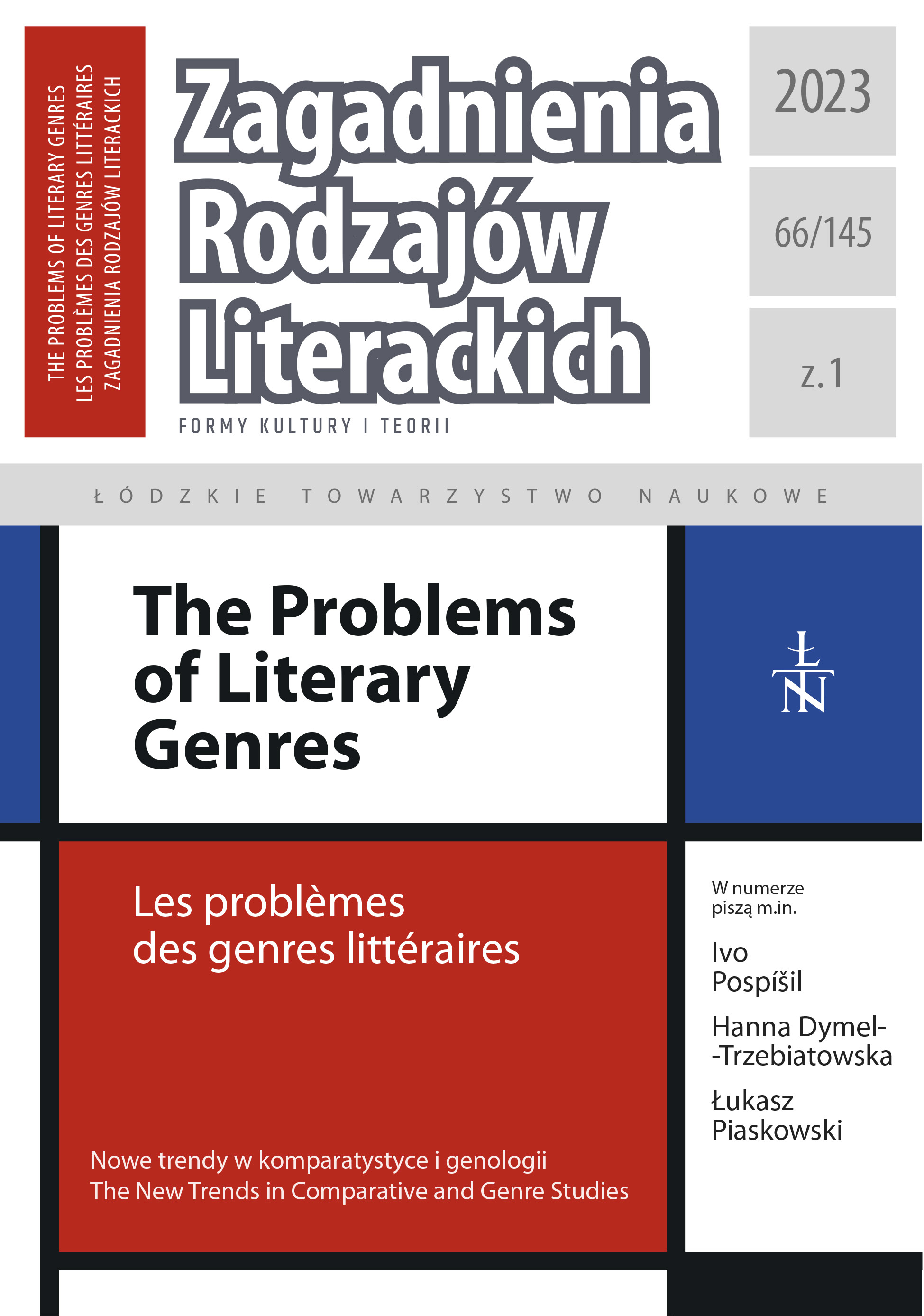Modern Lyric Poems: From Poetic Genre to Cognitive Category
DOI:
https://doi.org/10.26485/ZRL/2022/66.1/30Słowa kluczowe:
lyric poems; modern genres; cognitive poetics; categorization theory; cognitive scienceAbstrakt
Literary genres are important concepts for literary scholars and students of literature alike. Yet differences in opinion are common when defining which literary genre a given text fits best. However, my study here takes a step back from that spot to see how critics and other academics can conceptualize a literary genre in the first place. My case study is the modern lyric poem, a well-known literary genre in poetics. The results, never before published, include replies to an informal survey carried out at an international cognitive poetics conference at Osnabrück University in Germany. I begin by discussing handbook definitions and examples named. Then I compare them to results obtained from participants at the academic conference. Results sometimes overlap, aligning with criteria published in handbooks, although there are variations. I consider various reasons why participants might have selected certain examples of the genre, before ending with some suggestions of topics for future research on cognition in poetics.
Liczba pobrań
Bibliografia
Abrahms M.H. (1999), A Glossary of Literary Terms, 7th edition, Heinle & Heinle, Boston.
Baldick Chris (1996), The Concise Oxford Dictionary of Literary Terms, 1st edition, Oxford University Press, Oxford.
BBC (1996), The Nation’s Favourite Poems, foreword by Griff Rhys Jones, BBC Books, London.
Całek Anita (2021), Dialogowość listu w świetle koncepcji polifonicznego Ja, “Zagadnienia Rodzajów Literackich” vol. LXIV, no. 3, DOI: 10.26485/ZRL/2021/64.3/2.
Cluysenaar Anne (2006), ‘Lyric’ [in:] The Routledge Dictionary of Literary Terms, 3rd edition, eds. P. Childs, R. Fowler, Routledge, New York.
Cuddon J.A. (1992), The Penguin Dictionary of Literary Terms and Literary History, 3rd edition Penguin, London.
Delcroix Maurice and Walter Geerts (1980), ‘Les Chats’ de Baudelaire: Une Confrontation de Methodes, Presses universitaires de Namur, Belgium.
Drabble Margaret (1985), The Oxford Companion to English Literature, 5th edition, Oxford University Press, Oxford.
Geeraerts Dirk (2006), Words and Other Wonders: Papers on Lexical and Semantic Topics, “Cognitive Linguistics Research” no. 33, Mouton de Gruyter, Berlin.
Glushko Robert, Paul Maglio, Teenie Matlock, and Lawrence Barsalou (2008), Categorization in the Wild, “Trends in Cognitive Science” vol. 12, no. 4, DOI: 10.1016/j.tics.2008.01.007.
Hamilton Craig (2013), The Modern English Lyric Poem: A Poetic Genre as a Cognitive Category, Presentation at the 1st International Cognitive Poetics Conference, Osnabrück University, Germany, 26 April.
Kahneman Daniel (2011), Thinking, Fast and Slow, Penguin, New York.
Mach Anna (2020), What is ‘punk cabaret’? An Attempt to Define and Exemplify the Phenomenon, “Zagadnienia Rodzajów Literackich” vol. LXIII, no. 4, DOI: 10.26485/ZRL/2020/63.4/10.
Markowska-Fulara Helena (2019), On Didactic Poetry. The Criterion of Purpose as the Principle of Generic Classification in Polish Classicistic Poetics, “Zagadnienia Rodzajów Literackich” vol. LXII, no. 3, DOI: 10.26485/ZRL/2019/62.3/2.
Maryl Maciej, Niewiadomski Krzysztof, Kidawa Maciej (2016), Teksty elektroniczne w działaniu: typologia gatunkow blogowych, “Zagadnienia Rodzajów Literackich” vol. LIX, no. 2, HANDLE: 11089/46040.
Mikołajczak Małgorzata (2019), Wiersz jesienny jako przedmiot badań. Propozycja genologiczna, “Zagadnienia Rodzajów Literackich” vol. LXII, no. 3, DOI: 10.26485/ZRL/2019/62.3/5.
Perloff Marjorie (1982), Pound/Stevens: Whose Era?, “New Literary History” vol. 13, no. 3, DOI: 10.2307/468795.
Plottel Jeanine Parisier (1983), The Battle of Charles Baudelaire’s ‘Les Chats’, “Romanic Review” vol. 74, no. 1.
Richardson, Brian (1997), Remapping the Present: The Master Narrative of Modern Literary History and the Lost Forms of Twentieth-Century Fiction, “Twentieth Century Literature” vol. 43, no. 3, DOI: 10.2307/441913.
Sinding Michael (2005), ‘Genera Mixta’: Conceptual Blending and Mixed Genres in “Ulysses”, “New Literary History” vol. 36, no. 4.
Sinding Michael (2010), From Fact to Fiction: The Question of Genre in Autobiography and Early First-Person Novels, “SubStance” vol. 39, no. 2.
Swales John (1990), Genre Analysis: English in Academic and Research Settings, Cambridge University Press, Cambridge.
Sygizman Kinga (2021), Opowieść rodzi się w dialogu — specyfika narracji w reportażu radiowym, “Zagadnienia Rodzajów Literackich” vol. LXIV, no. 4, DOI: 10.26485/ZRL/2021/64.4/8.
Taylor John (2001), ‘Linguistics: Prototype Theory’ [in:] The International Encyclopedia of the Social & Behavioral Sciences, eds. N.J. Smelser, P.B. Baltes, Elsevier (Pergamon Press), Amsterdam.
Tversky Amos and Daniel Kahneman (1973), Availability: A heuristic for judging frequency and probability, “Cognitive Psychology” vol. 5, no. 2, DOI: 10.1016/0010-0285(73)90033-9.
Ungerer Friedrich and Hans-Jörg Schmid (2006), An Introduction to Cognitive Linguistics, 2nd edition, Routledge, London.
Pobrania
Opublikowane
Jak cytować
Numer
Dział
Licencja
Prawa autorskie (c) 2023 Łódzkie Towarzystwo Naukowe i autorzy

Utwór dostępny jest na licencji Creative Commons Uznanie autorstwa 4.0 Międzynarodowe.







